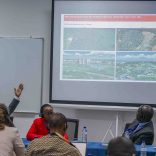Mozambique: South Korea provides €881,000 for humanitarian aid in Cabo Delgado
Revised Penal Code brings improvements in privacy protection, but raises questions about freedoms – DW

FILE: For illustration purposes only. [File photo: DW]
An expert sees no reason for the revised Penal Code to be distrusted. claiming that changes are already in the Constitution. But is there room for conflict between the right to privacy and the right to freedom?
According to the Mozambican Presidency portal, President Filipe Nyusi has now promulgated and sent for publication the Penal Code Revision Law and the Penal Procedure Code Revision Law approved by Parliament in July 2019.
The revised Penal Code specifies new crimes, notably criminalising the activity of recording, registering, using, transmitting or disseminating conversation, telephone communication, images, photography, video, audio, detailed billing, messages contained in email, social media or in any other third party data transmission platform without consent.
This has made many journalists suspicious, some now opting for discretion before making any assessment, as is the case with Fernando Lima: “I do not feel comfortable commenting and need to investigate further first, because it seems to me that what has been legislated is very worrying,” he says.
Curtailment of freedoms?

Journalists fear that the planned criminalisation could be a curtailment of freedoms, particularly of the press, and could result in limiting sources.
However, social media professor Sérgio Langa points out that “some of these extracts from this new Penal Code published by some of the press are not necessarily new. For example, on the question of the nullity of what would be [otherwise considered] evidence which is deemed illegal or acquired through coercion, which are often used in journalism, if we look at paragraph 3 of article 65 of the Constitution, this is already postulated.”
Langa downplays the matter, saying: “I mean, maybe there’s unnecessary fuss. It’s not necessarily a new subject.”
Privacy vs. freedom

A trend towards greater privacy protection viewable as an achievement can be seen in the document. But, on the other hand, doesn’t this trend collide with freedom of the press?
“Concerning fundamental rights and freedoms of the citizens, without any intention of diminishing them, the right to privacy may sometimes be overridden by the right to freedom of the press. If you notice, the issue of privacy is a right which operates in the private sphere, while the freedom of the press is more in the professional field. Of course, after information is disclosed, it can, in some way, also be claimed by the person as a fundamental right to have access to information,” lawyer Job Fazenda posits.
There can be no contradiction among laws
These suspicions or doubts can perhaps be “cooled” on the principle that the laws should not contradict each other, that is, that the Penal Code does not clash with Press Law.

“If the Penal Code at any time contradicts a previous law, it is presumed that the previous law, where there is contradiction, has been repealed. But if the same code contradicts the Constitution, the part referring to contradiction, the Constitutional Council may well declare unconstitutional. It is not practical for the current Penal Code to contradict the Press Law,” Fazenda explains.
An opportunity to remake the media industry
But the new Penal Code does not only sow mistrust in the media; it also brings opportunities for the sector to mature, media expert Sérgio Langa says.
“On the other hand, it is important that we look at the Penal Code from another angle. I see an opportunity here for us to remake the media industry in terms of robustness, in terms of producing local content, especially television,” he says
“There is research data which shows the paucity of locally produced content. It means that national television is mostly fed by ‘canned’ products. And the local content is centred on poor images, and some obtained under illicit circumstances, in light of this new Penal Code.”
And, in that sense, he warns: “So, it would be important that we look at the new Penal Code as an instrument which could enable a revolution in the productive base in our media industry.”













Leave a Reply
Be the First to Comment!
You must be logged in to post a comment.
You must be logged in to post a comment.